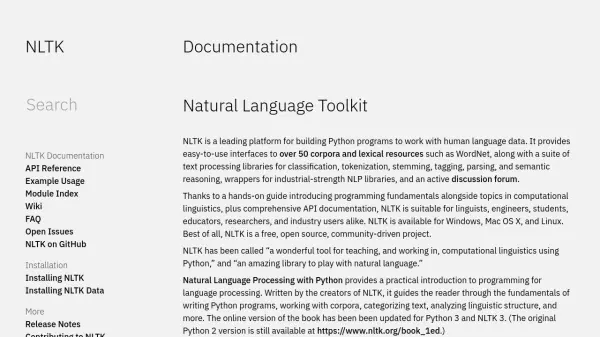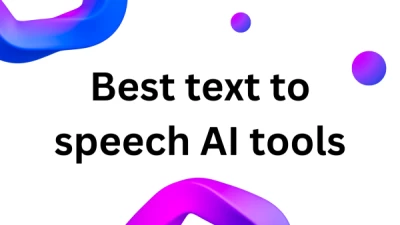What is NLTK?
NLTK, the Natural Language Toolkit, is a prominent platform designed for developing Python applications that process human language data. It provides accessible interfaces to numerous corpora and lexical resources, including WordNet. The toolkit features a collection of text processing libraries enabling tasks such as classification, tokenization, stemming, tagging, parsing, and semantic reasoning.
Additionally, NLTK includes wrappers for robust, industrial-strength NLP libraries. Accompanied by a practical guide that introduces programming concepts alongside computational linguistics topics and extensive API documentation, NLTK serves a diverse audience, including linguists, engineers, students, educators, researchers, and industry professionals. It is a free, open-source, community-driven project available for Windows, Mac OS X, and Linux.
Features
- Text Processing Libraries: Includes tools for classification, tokenization, stemming, tagging, parsing, and semantic reasoning.
- Corpora and Lexical Resources Access: Easy-to-use interfaces to over 50 corpora and lexical resources like WordNet.
- Python Integration: Designed specifically for building Python programs for NLP tasks.
- Cross-Platform Compatibility: Available for Windows, Mac OS X, and Linux.
- Open Source: Free, community-driven project.
- Educational Resources: Accompanied by a book ('Natural Language Processing with Python') and comprehensive API documentation.
Use Cases
- Developing NLP applications in Python.
- Teaching and learning computational linguistics.
- Researching human language data.
- Tokenizing and tagging text data.
- Parsing linguistic structure.
- Performing semantic reasoning on text.
- Accessing linguistic corpora and lexical resources.
Related Queries
Helpful for people in the following professions
NLTK Uptime Monitor
Average Uptime
97.4%
Average Response Time
88.2 ms
Featured Tools
Join Our Newsletter
Stay updated with the latest AI tools, news, and offers by subscribing to our weekly newsletter.







